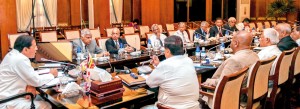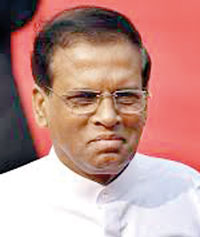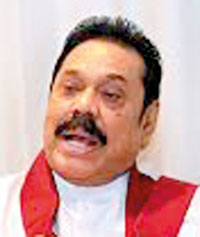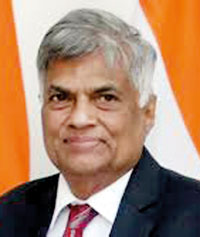Columns
The Crucifixion and the Resurrection
It’s what you might call the near death experience. The crucifixion of the coalition government on the cross of a people’s verdict two weeks ago. Its interment thereafter and its resurrection this Wednesday.
For eleven excruciating days Sri Lanka had no government. As the results of the local government elections trickled in that February 10th night showing a swing to the Peiris party of Rajapaksas’ lotus hopes and turned into a flood by Sunday morning confirming that the Pohottuwa Party had excelled beyond expectations and had won the majority of the Pradeshiya Sabhas, the nerdy reaction of the Unity Government was to go into a tailspin and leave the nation leaderless.
 The ship of government, having floundered on the rocks and sprung a leak, was also left rudderless, with the captain bickering with his first mate on the ship’s bridge demanding he walk the plank, along with the majority of the crew, as if that would have enabled the leaking vessel to limp safe home to port.
The ship of government, having floundered on the rocks and sprung a leak, was also left rudderless, with the captain bickering with his first mate on the ship’s bridge demanding he walk the plank, along with the majority of the crew, as if that would have enabled the leaking vessel to limp safe home to port.
True the final result showed the Pohottuwa Party had, to its credit, won the great majority of local government councils. But did that justify the ruling government to get its pants in a twist? Why the mad rush to press the panic button and send Save Our Souls signals? Even as it did not call for complacency, it did not raise the need for undue alarm either.
The Sri Lanka Podujana Peramuna had won 44 per cent of the popular vote. Of course, it is an admirable feat and congratulations are in order. Especially for a party recently born out of political expediency with no political philosophy of its own other than that inherited from the mother ship, the Sri Lanka Freedom Party to boast about. What was clear about the SLPP victory was that the triumph was solely based on a personality cult: The Mahinda Rajapaksa factor. Like moths drawn to a flame, the votes gathered around his charismatic frame in the manner pins stick to an electro magnet. Once the power fails, the pins fall, once the flame extinguishes, the moths flee.
At this election, it was the SLPP’s greatest strength. But if the lotus intends to blossom in full bloom in the years to come, it can also be its greatest weakness. For personality cults can rise, fall and fade like the lotus which rises from the mud to bloom in the sun only to wilt and droop and return to the mire at sunset.
For the United National Party, for the United People’s Freedom Alliance and its main component, the Sri Lanka Freedom Party, the February 10 election disaster was indeed a crushing, mind debilitating blow. A chilling wake-up call from the grasslands of Lanka. It was, no doubt, an anti-government protest vote that enabled the SLPP to pip the post and emerge as the winner in its maiden outing at this third league Newbury trials before graduating to compete at the Royal Ascot. And the people had much to protest about.

THE COALITION FRONT: ‘Brain dead’ coalition govt. on UNP ventilator with heart still pumping to keep organs alive
The anger stemmed from broken promises. In that rainbow dawn of January 8, 2015, the Maithri-Ranil combo had promised them on election platforms in the run-up to the polls that they would bring the mega Rajapaksa regime’s rouges to justice no sooner they came to power. Three years have passed and it had been water under the bridge. The lame duck excuse of the law’s delay has been forwarded to justify its shame.
Dilrukshi Wickremesinghe, appointed in that rainbow morn to be the Bribery Commissioner, did a splendid job but was summarily sacked — sorry, was forced to resign — on the charge she overstepped her boundaries. Today the Bribery Commission is confined in the main to filing action against school principals for accepting Rs 25,000 bribes to admit a child to school. The FCID’s swank office at the Bandaranaike Memorial International Conference Hall was turned to auditioning couches where stars of infamy turned up for casting sessions and left with a ‘voice cut’ to the waiting media on the BMICH steps. In recent times even that has come to a stop and the masses are denied their regular TV series of ‘Meet the Crooks’.
And while the dossiers the FCID team managed to compile from their arduous investigations gather dust at the Attorney General’s Office, the Attorney General has been elevated to the status of the nation’s supreme arbiter to decide on whom to prosecute and whom not to. His lawful excuse: not enough evidence. If there was selective law enforcement during the Rajapaksa era, the AG’s office has become the centre point for selective justice during the Sirisena regime. Justified, of course, on the presumed lack of evidence to prove beyond reasonable doubt the guilt of the accused.

Sirisena: Desperate
But does not that stance serve to usurp the role of the judge and jury? Isn’t it for the courts to decide whether the evidence suffices? If there is a prima facie case against anyone, shouldn’t the AG’s office prosecute? Or has that office to play the role of judge and jury and determine the guilt of an accused beyond reasonable doubt before they venture forth to place it upon a judge’s table to get it rubber stamped?
The President himself announced last month that no top political figure should be arrested unless there is a watertight case that will ensure a sure fire conviction in court. But can even the Attorney General second guess what evidence is required to guarantee a conviction. If that is to be the yardstick for filing action against suspected criminals, then not even a suspected robber or murderer can be brought to court.
Guilt can only be determined in a court of law and not at the AG’s office. No Attorney General can give any assurance that the evidence he possesses is hundred percent solid unless he is appearing before a kangaroo court with judgment pre-decided.
A series of different signals as to the government’s commitment served to waylay the cause of justice. As a result the mega rogues whom the Unity Government promised the nation would be brought to justice are free today to roam not only the broad acres of the land but also to fly abroad and see the world.
Then also there was the promise to develop the economy and bring down the cost of living. On the development side there was nothing much the coalition government could do to impress the masses. The Rajapaksa regime had robbed them of that privilege. Apart from the Prime Minister promising to turn the nation into the miracle of Asia — another Rajapaksa boast — to create free trades zones of development, the dream is yet to materialise. All that the Government had done was to continue with road and infrastructure the former regime had initiated with the help of massive Chinese investment. And whilst the Government continued these projects, including the Colombo Port City, the credit belonged to the Rajapaksas: to the present Government the flak.
The previous regime’s development was visible to the masses and thus caught the public imagination. The Unity Government’s plans to reduce the international debt as a result of these ambitious projects caused it to heap burdens on the public. It was a case of one inheriting the sins of his forefathers. Its plans were more in the abstract but its results plainly visible to the masses in terms of hardship. It ignored the masses plight but did not fail to expend its largesse to parliamentary MPs and give them luxurious vehicles costing billions of rupees in total. While the poor were asked to tighten their belts and pay penance because the Government had to service the international debt, the rich, the elite, the MPs could loosen it and dine in style and eat to their hearts content.

Mahinda: Jubilant
And as far as the cost of living, the less said the better. Whilst the cost of eating sambol and rice rose to equal the price of a single egg hopper at restaurants where the city elite dines, with the coconut sarcastically described as gold by the insensitive Minister John Amaratunga due to its rising price. There may have been many other grounds for the anti-Government vote that made the bud bloom.
But above all it was also a vote for instability.
Perhaps the masses did not realise the gravity of playing marbles with their ballots. And even as the people voted at this poll to elect the bottom rung of people’s representatives, may they be forgiven for this dereliction for they did not understand what they were voting for. Not for a party but for the nation’s political stability without which no economic gain will accrue to this country. On the one hand the people vote for change in midterm out of whim, on the other hand they demand stability that is indispensable to further their fortunes.
But they were not alone in their folly. They were keeping exalted company with the President at the high table of collective ignorance. From the top most echelons of power right down to the grassroots, none realised the folly born of ignorance. That one cannot ask for a slice of cake baked on a heat fluctuating temperamental oven. That political stability is vital for economic growth; and without it no amen can be said in thanksgiving prayer for delivering the nation its daily bread, let alone a piece of Rose Blanc cake.
It took the Central Bank Governor Dr. Indrajit Coomaraswamy last Friday to give the nation his sagacious advice on the importance of political stability to investor confidence. He said: “For the country to have a better outcome Sri Lanka needs political stability as quickly as possible. We have not really considered the political situation when making this decision on policy rates. How politics could affect is on sentiment, which leads to a reduction in investment and growth. Clearly one would need to loosen policy, then to support growth, but you also have to look at what happens to fiscal policy. If the political situation leads to a loosening of fiscal policy, the Central Bank would have to lean against that and tighten monetary policy.
“The greater economy would benefit significantly from political stability and would be able to build on the macro stabilization that had emerged in the last few months of 2017. Political instability could also adversely impact the debt servicing dynamics given Sri Lanka will have to repay about $ 3.6 billion each year from 2019 to 2022.”
Pity the CB Governor’s words of warning of the importance of political stability and how its absence would cause the nation dearly came too late in the day. For earlier that week, a shell shocked President Sirisena whose own SLFP had only garnered an embarrassing 4.44 per cent of the local government poll began, perhaps on the advice of those in his new inner circle, to court the friendship and form an alliance with the very men he had sworn to bring to justice three years ago. And to do so by kicking out the party — the UNP — that had made him president and with whom he had shared a partnership of just governance. And that, if not for the 106 UNP seats in parliament being the ventilator, Sirisena’s SLFP would have been condemned brain dead long time ago.
Was Yahapalanaya to be betrayed on the basis of a local government result? Was the five year mandate given to him by the people in 2015 to be sacrificed on the shifting sands of public opinion expressed only to signal their discontent with his government‘s performance, the red card raised as a warning during play to clean up the act or that serious consequences will follow, including the punishment to be sent off the field, perhaps in Sirisena’s case, permanently.
In the aftermath of the election result, his actions only served to undermine his own position, to show him as a seven stone weakling on a beach for heavyweights to kick sand on his face with contempt. The knee jerk reaction was not only to remain cowed downed but to surrender all to those who had bamboozled and bulldozed their way to regain the Paradise it had lost in January 2015.
Whilst the Rajapaksa faction gloated over their seeming triumph and demanded the coalition government to resign forthwith, the unity government went on the defensive. Nay, worse, it became absorbed in an internecine war. Sirisena’s focus turned on demanding the Prime Minister’s resignation which made the country’s confusion more confounded.
But was there any need for such paranoia?
Let’s consider the joint opposition’s demands after its party vehicle the SLPP had won 44 per cent of the popular vote.
Their first demand was for the Government to resign, claiming the Unity Government had lost the people’s mandate. But had it?
In the first place, the coalition government was elected to Parliament for five years. Local government elections are held to elect members to local councils, the third tier of the political set up. In fact, it lies at its very bottom. Whilst its election results may indeed serve as a useful barometer of public opinion and may be useful in gauging trends, no one can credibly claim that when a person uses his ballot at the polling booth he or she is doing so to change the government. They are using it only to decide which political party will remove their garbage from their door step.
If anyone thinks otherwise they are much mistaken. Changing governments is reserved for general elections. And for the Rajapaksa faction headed by the nerdy Peiris, a professor of law no less and author of many a legal tome to now squeak otherwise, to claim that the results of a local government election is a determining factor of the central government’s existence and its constitutional right to rule for the period the people mandated it to rule, is a travesty of law and an affront to common sense.
It is true that the SLPP won 231councils out of 340; The UNP won 34, the SLFP 7, UPFA 2, Illankai Tamil Arasu Kachchithe 41 and the JVP zero. But out of the 231 the SLPP won, over 160 councils remain deadlocked and whether the SLPP will get the right to dominate is in the hands of the other parties for it was a tight result.
So much for the election results and the councils each party has won. But can the SLPP ask for the Unity Government’s resignation on the basis of the number of local council’s won? The number of councils won or lost or the number of councilors who will take their seats come March 2, will not change the composition of the parliament by one jot. As the Hon. Speaker will tell you members of Parliament were elected in 2015 to serve for five years and no petty local election can alter that.
Furthermore, if the life of Parliament was subject to the changing whims and fancies of a fickle populace who base their choice on different norms when voting at different elections, then this nation will have a surfeit of elections and playing the polls will replace volleyball as the country’s official national sport.
Having no legal basis to call for the resignation of the coalition government, has Peiris, the onetime respected law professor turned Rajapaksa porter now turned Rajapaksa chauffeur of the Rajapaksa vehicle the SLPP have any other right to demand the coalition government to resign on the basis of the local government election result?

Ranil: Defiant
Of course not. And the arithmetic will show why. The SLPP obtained 44.65 percent of the popular vote. But what did the coalition government, whose resignation the SLPP now demands, get at this same election?
The coalition government is made up of the UNP and the UPFA of which the main component is the SLFP. If one is demanding the resignation of the coalition government then one must consider the amount the coalition, though its constituents for political reasons of their own contested on separate tickets, won at this local government election.
The final result as confirmed by the Election Commissioner is thus; The UNP received 32.63 per cent of the nation’s vote. The UPFA got 8.94 per cent and the SLFP recorded 4.44 percent of the vote. And the grand total of the parties that constitute the present coalition government is 46.01 percent. Seen in that sober light, on what grounds can the SLPP which received 44 percent of the vote demand the resignation of the Unity Government which gained 46 percent of the national vote? Can the loser ask for the crown from the victor?
Secondly, the SLPP has held this local election as a national referendum. But on what basis have they done so? Is it on any legal basis or as a figment of their imagination? Have they announced it prior to the election? Nay, only after the event. But let’s for child’s play and amusement, consider the election to have been a national referendum. And what does the result show. That 55.35 percent of the country’s voting populace have voted against the SLPP.
Lotus bud SLPP stalwarts refer to David Cameron’s resignation after the British public voted 50.89 in favour of leaving the European Union. Cameron resigned — though he really need not have done so — not only because he was a gentlemen abiding by the age old traditions of the country but also because he had on his own determined to solicit the opinion of the British people; and when he, the prime mover in the campaign for Britain to remain in the European Union, found that 51 per cent of the citizenry held otherwise, even though it was by a thin margin, he did the gentlemanly thing and left.
But by no stretch of imagination can the British national referendum on the EU be compared to a Gam Sabha election in Lanka. Simply put, the LG elections were not a national referendum. And if one imagined it was, then the reality is that the SLPP lost it.
Thirdly the SLPP has now deemed it fit to question the legitimacy of the coalition government by demanding to see the marriage certificate. According to the SLPP the Memorandum of Understanding has lapsed. This week it called for the production of a new one in writing.
But don’t the dullards realise that an MOU is merely an agreement written down for mutual comfort. That it has no legal force but serves only as evidence to show intention exist. And that even in its absence, oral agreement is sufficient. That only in any matters connected to land that the law requires the agreement not only to be put down in writing but demands attestation by a notary and two witnesses.
And thus when Ranil Wicremesinghe rose from his seat in Parliament this week and reaffirmed the resurrection of the coalition government and the UPFA Secretary Amaraweera rose from his seat to confirm the agreement, no further action, no papyrus written with a quill recording the mutual understanding and agreement was necessary to prove to the House and the nation that the coalition government had been resurrected once again.
The only question is whether after all the procrastination, the crucifixion and the resurrection this week, whether there will be a second coming for either of the coalition partners if they continue to be the spendthrifts of the nation’s goodwill and trust?


Leave a Reply
Post Comment